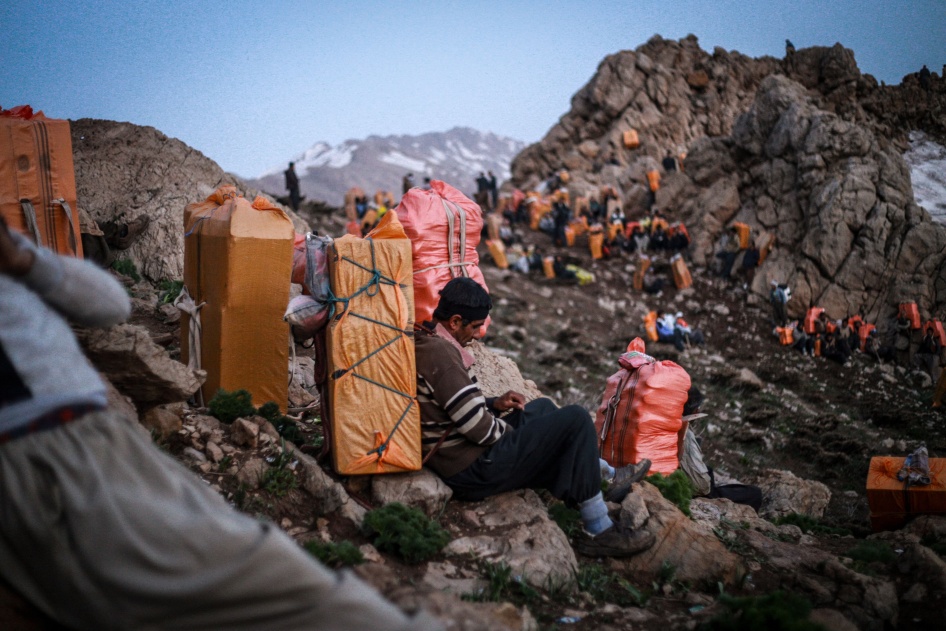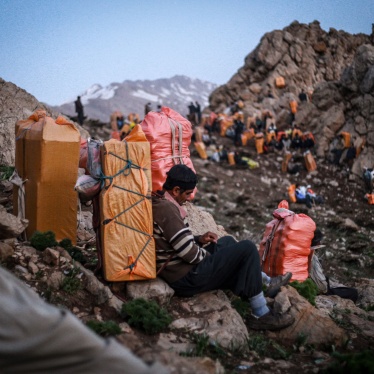(Beirut) – Iranian authorities under the new president should halt their use of excessive and lethal force at the Iran-Iraq border against predominantly Kurdish kulbars (border couriers), who come from marginalized communities, Human Rights Watch and the Centre for Supporters of Human Rights (CSHR) said today.
Masoud Pezeshkian, the newly elected president of Iran, said during his presidential campaign in Sanandaj in June 2024: “It is shameful that our youth have to engage in kulbari [transporting goods across border] for a piece of bread. We must establish a border that facilitates trade, not kulbari.” Just three days after Pezeshkian’s election, five border couriers were shot at the border in Nowsud, in Kermanshah province, which led to the death of one of them, according to Kurdistan Human Rights Network.
“Marginalized Kurdish communities often turn to bringing goods over the border, legally or not, for lack of other economic opportunities,” said Nahid Naghshbandi, acting Iran researcher at Human Rights Watch. “Incoming President Pezeshkian should prioritize improving the state’s treatment of minorities, including the Kurdish border communities.”
On July 8, 2024, Human Rights Watch released an investigation into Iranian authorities’ serious violations against border couriers. On the same day, CSHR released a report that investigated the socioeconomic, legal, and human rights factors that shape the lives of Kurdish border couriers.
The research by CSHR and Human Rights Watch illustrates how Kurdish border couriers reflect broader systemic government failures in Iran’s underdeveloped border regions, the groups said. Driven by poverty, border couriers confront constant dangers from harsh terrain and lethal force used by Iranian security forces.
In June 2023, a member of the Iranian parliament’s National Security Commission announced the completion of a review of pending legislation, with proposed amendments that not only would broaden security forces’ ability to use firearms against border couriers but also the conditions under which they can do so. If passed into law, the amendments would put border couriers at even greater risk.
“Incoming President Pezeshkian should collaborate with the judiciary and legislative branches of the government to ensure that the pending legislation on the use of firearms prevents security forces from indiscriminately injuring and killing individuals, particularly at the border,” said Shabnam Moinipour, program director of CSHR. “It is essential that legal amendments be instituted to recognize and preserve the rights of kulbars, ensuring that perpetrators do not receive impunity.”
Iranian authorities’ use of excessive and lethal force against border couriers has had devastating consequences. Reports from the Kurdistan Press Agency (Kurdpa) state that in the first half of 2024, 33 Kurdish border couriers died and 254 were injured, including 14 children, most of them shot by security forces. Since 2011, Kurdpa has documented 2,463 deaths and injuries among couriers in Iranian Kurdish regions.
“When article 28 of the Iranian Constitution mandates the government to create jobs in all regions of Iran, it is unacceptable that this region has been neglected to the point where individuals, particularly men, must risk their lives to feed their families,” Moinipour said. “At the very least, these individuals should not be subjected to violence, driven by deeply rooted prejudice, from their fellow countryfolk.”
Many border couriers have been severely injured by landmines, including loss of limbs. While many landmines were placed in border areas during the 1980-1988 Iran-Iraq war, some border couriers believe that Iranian security forces have used mines more recently along their routes. Iran is not among the 164 countries that have joined the 1997 Mine Ban Treaty, which comprehensively prohibits antipersonnel landmines and requires mine clearance, stockpile destruction, and victim assistance. Injuries often lead to lost livelihoods.
Access to justice for border couriers remains limited, exacerbating their social and economic marginalization. Iran’s legal system prioritizes national security over individual rights, leaving the victims with little protection under the law. Efforts to seek justice are often thwarted by systemic biases, lack of transparency, and the broad discretionary powers granted to security forces. Without social or unemployment benefits in Iran, the injured cross-border couriers’ only hope is to be recognized as disabled veterans and receive disability benefits.
Iran should reassess its socioeconomic strategies for marginalized communities, including in predominantly Kurdish areas from where border couriers originate, and commit to upholding the rule of law. Measures should include stimulating economic growth in border areas, implementing labor protections, and ensuring robust social safety nets. Investment in education and vocational training is crucial to provide viable alternatives to high-risk jobs.
The United Nations Basic Principles on the Use of Force and Firearms by Law Enforcement Officials state that law enforcement officials shall not use firearms except in self-defense or defense of others against the imminent threat of death or serious injury, to prevent a particularly serious crime involving grave threat to life, to arrest a person presenting such a danger and resisting their authority, or to prevent their escape, and only when less extreme means are insufficient. In any event, intentional lethal use of firearms may only be made when strictly unavoidable to protect life.
The UN Fact-Finding Mission on Iran and the UN special rapporteur on the situation of human rights in Iran should monitor and report on the treatment of Kurdish border couriers in Iran.
“Incoming President Pezeshkian should work closely with Iran’s parliament to accede to the Mine Ban Treaty, facilitating Iran’s membership in this crucial international agreement,” Moinipour said. “By joining the treaty, Iran can demonstrate its commitment to protecting civilians, particularly in border regions where landmines pose a severe threat.”







